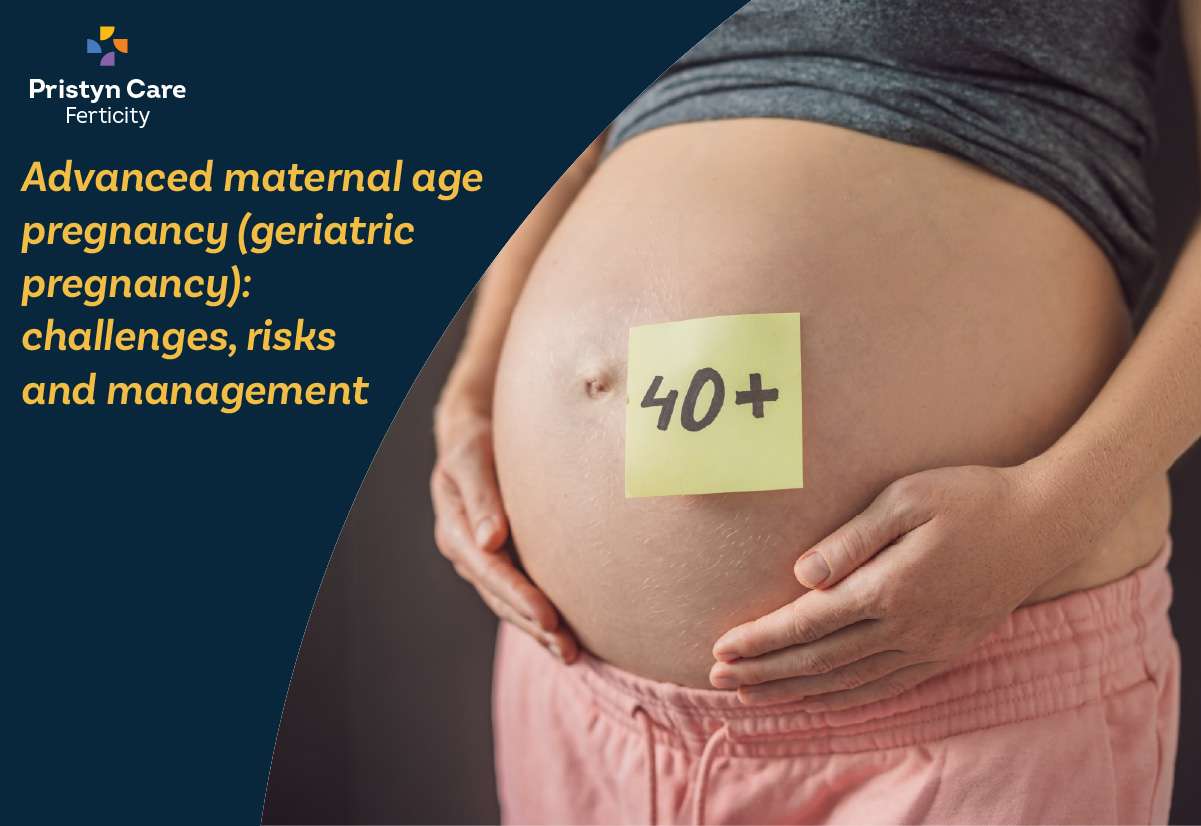Pregnancy is an exciting experience, however, if you’re above 35 of age, it comes with certain challenges. Advanced maternal age pregnancy, also known as geriatric pregnancy, is more common in today’s day and age. But, it’s necessary to be aware of the potential challenges, risks and the ways to manage them to enjoy a smooth pregnancy experience and birth a healthy baby.
Challenges of advanced maternal age pregnancy
Following are some of the common difficulties that can come with a geriatric pregnancy:
- Fertility declines naturally: Egg quality and quantity decline, making it more tricky to conceive. Possibly, ovulation may also get irregular which in effect slows down the probability of natural pregnancy. Fertility treatments like IVF, IUI, etc. can be your go-to option.
- Risk of Genetic disorders slightly increases: Chromosomal abnormalities like Down syndrome are more common in a pregnancy after 35. Doctors recommend genetic testing and prenatal screenings to ensure your safe pregnancy and fetal health
- You are more likely to go through pregnancy complications: Higher chances of gestational diabetes, high blood pressure, and preeclampsia. Increased risk of placenta-related issues like placenta previa. Preterm labor and low birth weight are more common.
- Labor & delivery can be more difficult: Increased chances of prolonged labor or needing a C-section. It may even take longer for you to recover (postpartum recovery).
Risks of advanced maternal age pregnancy
- Higher chances of miscarriage: As egg quality declines, chromosomal abnormalities become more frequent, raising the risk of miscarriage. Underlying health conditions like thyroid disorders or autoimmune diseases can also contribute. Regular prenatal check-ups, a well-balanced diet, and proper medical guidance can significantly lower risks.
- Diabetes during pregnancy (gestational diabetes): Hormonal fluctuations can affect how the body processes insulin, leading to elevated blood sugar levels. If not managed properly, it can impact both mother and baby, increasing the chances of excessive birth weight and complications during delivery. A well-regulated diet, consistent physical activity, and medical supervision help keep it under control.
- More prone to high blood Pressure & Preeclampsia: Older mothers have a higher chance of developing hypertension and preeclampsia, conditions that can restrict fetal growth and lead to premature birth. Symptoms such as severe headaches, swelling, and vision changes should not be ignored. Close monitoring, stress management, and a low-sodium diet help mitigate risks.
- Premature birth & low birth weight: Babies born to older mothers are at a higher risk of preterm delivery (before 37 weeks), which can lead to developmental challenges. Placental function may decline, affecting oxygen and nutrient supply to the baby. Advanced neonatal care can help preterm babies thrive, but regular prenatal monitoring reduces the chances of premature birth.
- More likely to undergo c-section: Age-related factors, including weaker uterine muscles and complications like prolonged labor, increase the likelihood of a C-section. Prioritizing optimal health, attending childbirth classes, and discussing a birth plan with your doctor can ensure a smoother delivery experience.
How to effectively manage high risk pregnancy
Pre-pregnancy check-up is a must: Take it as a quick system check before beginning the next significant phase of your life. A thorough pre-pregnancy test helps bring to knowledge any potential problems early. So, there’s no harm in getting the check-up done. Also, knowing about genetic screening may also prove to be quite beneficial.
- Prioritize your healthy lifestyle: Your body is about to do some serious work, so nourish it with proper minerals and vitamins. Include more folic acid, iron, protein and fiber in your regular diet, it is the best thing for yourself and the baby. Keep aside time for walks, gentle body stretches, and light yoga as well.
- Keep up with regular prenatal care: Regularly showing up for doctor visits may not be exciting but they’re the most crucial. Routine check ups make sure that everything goes smoothly & detect anything early like a shoot in blood pressure or sugar level swings. Reap the big benefits of easy habits!
- Blood sugar and blood pressure should be under check: Pregnancy brings its peculiarity and these may act up at times. If you also go through gestational diabetes, a proper meal plan can help a lot. Also, blood pressure should be monitored to keep unnecessary health risks at bay. A little mindfulness goes a long way!
- Be prepared for labor and delivery: It’s important to mindfully prepare for the big day with ease and care. Speak to your gynecologist regarding your best-suited birthing option and prefer a flexible plan, because babies often cause some surprise! Though it’s better to try for natural birth as a goal, be mentally prepared for a C-section if the need arises. The more you’re aware, the more confident you’ll be.
If natural conception is getting difficult, IVF (In Vitro Fertilization) is an effective option for women over 35. As egg quality declines with age, advanced reproductive techniques come to help. IVF, ICSI, IUI, egg freezing (if you want to delay parenthood) etc. options also make it easy to plan pregnancy as per your timeline or convenience. Also, PGT (preimplantation genetic testing) helps to screen for chromosomal abnormalities to ensure a healthy pregnancy.
At Ferticity IVF & Fertility Clinics, our team handholds you at every step throughout the treatment. So, don’t get caught with random opinions and advice, speak to our fertility specialists, book your consultation now.
Also read Top reasons to choose IVF

